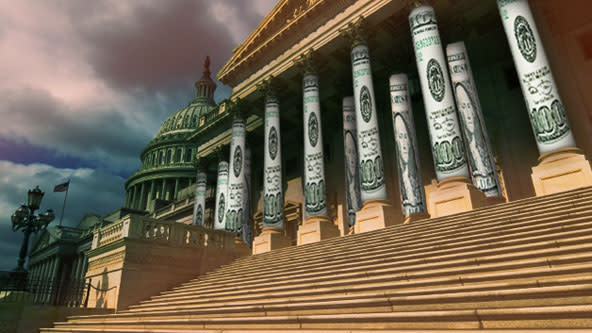Debt Default Could Cost US Households $15 Trillion: Analysis

With Republicans vowing to reject any bipartisan effort to raise or suspend the debt ceiling, and Democrats sticking to their plan to address the limit through a bill that requires support from both parties, the threat of default on U.S. payment obligations now looms over the economy – a scenario that could cause an immediate and deeply painful recession, according to a new report from Moody’s Analytics.
In their analysis, Moody’s chief economist Mark Zandi and co-author Bernard Yaros found that an extended stalemate over the debt ceiling would cause a recession that reduced employment by as much as 6 million, pushing the unemployment rate up to 9%. And the stock markets would crash, wiping out as much as $15 trillion in household wealth.
“This economic scenario is cataclysmic. … The downturn would be comparable to that suffered during the financial crisis,” Zandi and Yaros said.
Though less dramatic, a short-term default would be damaging, as well. “Even if resolved quickly, Americans would pay for this default for generations, as global investors would rightly believe that the federal government’s finances have been politicized,” Zandi wrote in a note to clients Tuesday.
Yellen issues another plea: In an opinion piece in The Wall Street Journal last weekend, U.S. Treasury Secretary Janet Yellen issued another warning on the debt ceiling, which currently stands at $28.4 trillion. Yellen said a default would spark a recession that would do permanent damage. "We would emerge from this crisis a permanently weaker nation," Yellen wrote.
“We can borrow more cheaply than almost any other country, and defaulting would jeopardize this enviable fiscal position,” Yellen said. “It would also make America a more expensive place to live, as the higher cost of borrowing would fall on consumers. Mortgage payments, car loans, credit card bills—everything that is purchased with credit would be costlier after default.”
One month to go: Moody’s estimates that the Treasury will be forced to default on payment obligations starting on October 20, and most experts have put the date somewhere in late October or early November. That gives lawmakers just a few weeks to figure out how to handle the debt limit before a potentially catastrophic default occurs. Both parties have said they are confident there will be no default, but for now there is no clear path forward to avoid such an outcome.
Moody’s warns that even if Congress resolves the problem before the default date, there may be a price to pay for the politicization of the debt limit. According to Zandi and Yaros, the battles over the debt ceiling in 2011 and 2013, when Republicans threatened to withhold support for raising the limit without concessions from Democrats, cost the U.S. economy dearly, reducing investment by as much as $180 billion and employment by 1.2 million jobs by 2015.
“Brinkmanship around this whole process will be reflected in higher cost to taxpayers,” Zandi told The Washington Post’s Jeff Stein. “There is a cost to doing this in a way that is not at least somewhat bipartisan.”

 Yahoo Finance
Yahoo Finance 